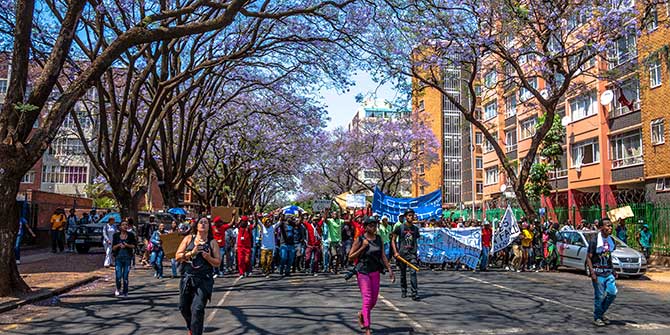Crossroads: Women Coming of Age in Today’s Uganda provides a compelling picture of the lives of women in contemporary Uganda. Although the book cannot be taken to represent Ugandan women everywhere, Richard Stupart says this collection of personal stories is timely.
A compilation of short, personal stories of over a dozen Ugandan women from a range of backgrounds, Crossroads is a refreshing re-humanisation of the people that development is so frequently ‘done to’. Edited by former Wall Street Journal editor Christopher Conte, the book is an attempt to let ordinary Ugandan women speak for themselves on a wide range of topics. From stories of detention and torture at the hands of the police and military, to confronting gender roles in rural villages and the daily life of more-progressive Kampala, each chapter is an honestly-told slice of life written by a cross-section of Ugandan women.
As a generation of modern Ugandans take advantage of opportunities that were never available to their  parents, the stories of many of the women in Crossroads often reflect a tension between the traditional expectations placed on women by their families and communities and the opportunities for new freedoms that work and relative prosperity in the cities makes possible. This theme of reconciling old and new ways of understanding gender and culture, and attempting to negotiate new female identities in contemporary Uganda is one that cuts through many of the stories told in the book. Many of the writers resolve these conflicts in progressive ways, even though often limited by circumstance. Decisions about managing new kinds relationships with men, or negotiating different roles as women with careers illustrate well a common desire for progressive, ‘modern’ freedoms in the face of an often strict and controlling ‘traditional’ culture.
parents, the stories of many of the women in Crossroads often reflect a tension between the traditional expectations placed on women by their families and communities and the opportunities for new freedoms that work and relative prosperity in the cities makes possible. This theme of reconciling old and new ways of understanding gender and culture, and attempting to negotiate new female identities in contemporary Uganda is one that cuts through many of the stories told in the book. Many of the writers resolve these conflicts in progressive ways, even though often limited by circumstance. Decisions about managing new kinds relationships with men, or negotiating different roles as women with careers illustrate well a common desire for progressive, ‘modern’ freedoms in the face of an often strict and controlling ‘traditional’ culture.
With the exception of Lydia Namibiru’s chapter It’s Complicated, many of the stories adopt a common trajectory of emergence from an oppressive, traditional past, towards a ‘modern’ Uganda free of some of the strictest demands on women’s lives. Namibiru’s story stands against these others as one which asks equally difficult questions about what kinds of new roles and rules the modern, ‘western’ Ugandan woman might be stepping into. It is this theme of emergence from the old Uganda into the new that gives the book its voice against paternalistic narratives of development. Each woman is her own agent, negotiating emergence in her own way, in her own circumstances.
This theme of emergence, however, is also my singular criticism of Crossroads. It is difficult to reach the end of the book without – somewhat ironically – pausing to wonder whether the generally progressive politics of the writers included in the book might not undermine its claim to representing the voices of the Ugandan everywoman. Whether intentionally selected to be so, or instead a function of the occupation, class, or other common traits of the writers, the politics of every voice is uniformly progressive. A conservative, traditional female voice – which must surely exist in Uganda – is not to be found in Crossroads, and that is a pity. In speaking back against an idea of the Ugandan women as someone to ‘be developed’, it is not enough to establish the agency of Ugandan women, where every agent is on a path from tradition to modernity, albeit in different ways. Crossroads affirms Ugandan women as intelligent, independent agents, but suggests that the resources for their emancipation in Uganda inevitably lie in their move towards the cities and the chance to escape old structures.

Bearing this criticism in mind, though, Crossroads can be read as an affirmation of the agency of women whose stories are all too often otherwise ignored, or summarised in development clichés. Though the writers should not be read as representing Ugandan women, or the female Ugandan experience writ large, their voices are an important, honest, and long-overdue part of it.
Crossroads: Women coming of age in Today’s Uganda. Edited by Christopher Conte. Create Space, 2015.
Richard Stupart is the Features Editor of African Defence Review and holds an MPP (Conflict Studies) and MA Media Studies (Media and Famine). His primary research interests are media representation and humanitarian response, empathy and duty to distant suffering, and mixed research methods. Richard’s work has included reporting on postconflict recovery in northern Uganda, critiques of humanitarian response, and research periods in South Sudan and the eastern Democratic Republic of Congo. He blogs at Where the Road Goes. Follow Richard on Twitter @wheretheroad.
The views expressed in this post are those of the authors and in no way reflect those of the Africa at LSE blog or the London School of Economics and Political Science.





